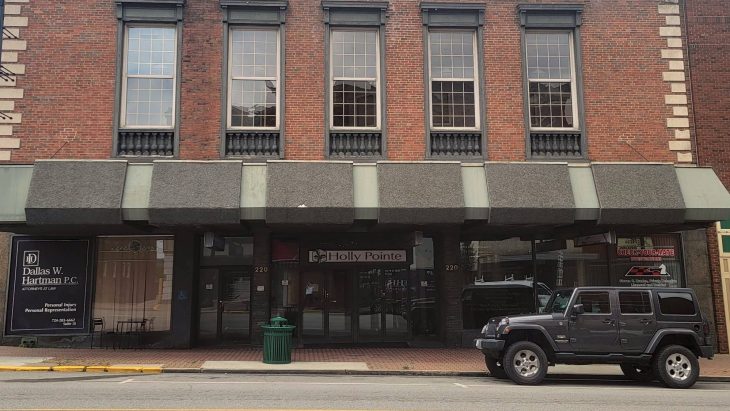Crossroads of Butler

About Crossroads of Butler
Crossroads is an outpatient Suboxone clinic in Butler, Pennsylvania. They focus on treating opioid addiction in adults. You can pay for treatment with several major insurance plans, including Medicare, Medicaid, VA CCN and TRICARE. Butler offers a calm and serene natural environment that’s close to Alameda Park, Butler Memorial Park and several community resources.
Breaking Barriers with Quick Access to Care
What strikes me most is their Instant Intake services. They help you overcome barriers like transportation and business hours with virtual visits. You can verify your insurance, complete an evaluation, choose a pharmacy and get a prescription for medication right from the comfort of your home. You’ll benefit from simple access to the support you need.
Medication Assisted Treatment (MAT) in Butler, Pennsylvania
A great thing I noticed about them is their MAT program. They prescribe Suboxone, an FDA approved medication, to manage cravings and withdrawal symptoms.
You’ll tackle the psychological side of addiction with group and individual counseling as well as relapse prevention strategies. I like that they also offer care coordination to help you access medical care, social services, behavioral health support and more.
Hepatitis C Treatment to Support Wellness
Another beneficial feature I noticed was that they provide Hepatitis C services. You can access support and treatment to address the physical and emotional impact of living with Hepatitis C. They offer medical care and connect you to resources to help you effectively manage your health.
Crossroads has built a supportive and nonjudgmental environment. They strive to uphold their values of respect, empathy and intuition. Former clients mentioned feeling cared for throughout their recovery process and experiencing improvements in their quality of life.
| Levels of Care | Detox Service Setting | Programs | Payment Options | |||
|---|---|---|---|---|---|---|
|
In outpatient therapy, you’ll attend therapy sessions several times each week while living at home. This is ideal if you have a strong support system and a lower risk of relapse. Outpatient treatment offers flexibility to maintain work, school or family obligations. |
||||||
|
Outpatient detox gives you access to medically supervised withdrawal services while still allowing you to live at home. You’ll attend a clinic for treatment and monitoring. This flexible option is suitable for those with mild to moderate withdrawal symptoms who have strong support systems. |
||||||
|
Adult programs address the substance use and life challenges specific to adults. Therapists can deliver sessions in individual, group and family settings. Services often include job support and life skills training in a structured environment. |
Cognitive behavioral therapy focuses on changing harmful thought patterns and behaviors associated with addiction. You’ll learn healthier coping mechanisms by identifying and replacing negative thoughts. This improves your emotional resilience and decreases your relapse potential. |
Drug detox programs support individuals who are withdrawing from addictive substances like cocaine and heroin. Medical support helps you manage symptoms in a controlled and safe environment so you can achieve initial sobriety. |
Men's programs address substance use while also considering the social pressures, family roles and mental health concerns that are specific to men. You’ll learn healthy coping mechanisms as you build emotional resilience and develop communication skills. |
Opioid detox uses medications to ease severe withdrawal symptoms. It also includes medical supervision to help you manage potential complications. These services allow you to stabilize and begin a recovery plan. |
Women's programs offer a safe and supportive space to focus on gender specific issues such as trauma, family roles and mental health conditions. Therapists tailor the sessions to address women's needs and foster empowerment in a healing and nurturing environment. |
Young adult programs are designed for individuals who are transitioning into adulthood. Topics of discussion typically include identity, independence and peer relationships. Providers may also offer life skills training and career support. |
|
Medicaid
|
Medicare
|
Private Insurance
|
Self Pay
|
Levels of Care
In outpatient therapy, you’ll attend therapy sessions several times each week while living at home. This is ideal if you have a strong support system and a lower risk of relapse. Outpatient treatment offers flexibility to maintain work, school or family obligations.
Detox Service Setting
Outpatient detox gives you access to medically supervised withdrawal services while still allowing you to live at home. You’ll attend a clinic for treatment and monitoring. This flexible option is suitable for those with mild to moderate withdrawal symptoms who have strong support systems.
Programs
Adult programs address the substance use and life challenges specific to adults. Therapists can deliver sessions in individual, group and family settings. Services often include job support and life skills training in a structured environment.
Cognitive behavioral therapy focuses on changing harmful thought patterns and behaviors associated with addiction. You’ll learn healthier coping mechanisms by identifying and replacing negative thoughts. This improves your emotional resilience and decreases your relapse potential.
Drug detox programs support individuals who are withdrawing from addictive substances like cocaine and heroin. Medical support helps you manage symptoms in a controlled and safe environment so you can achieve initial sobriety.
Men's programs address substance use while also considering the social pressures, family roles and mental health concerns that are specific to men. You’ll learn healthy coping mechanisms as you build emotional resilience and develop communication skills.
Opioid detox uses medications to ease severe withdrawal symptoms. It also includes medical supervision to help you manage potential complications. These services allow you to stabilize and begin a recovery plan.
Women's programs offer a safe and supportive space to focus on gender specific issues such as trauma, family roles and mental health conditions. Therapists tailor the sessions to address women's needs and foster empowerment in a healing and nurturing environment.
Young adult programs are designed for individuals who are transitioning into adulthood. Topics of discussion typically include identity, independence and peer relationships. Providers may also offer life skills training and career support.
Accreditations
Contact

Kelly Fitzgerald Junco is an author and marketing consultant who is best known for her award-winning blog, The Adventures of a Sober Señorita. She’s currently pursuing her Masters of Clinical Mental Health Counseling and is 11 years sober Her work has appeared on sites like the Huffington Post, Ravishly, and SheKnows.

Mariah Bourne earned a Master of Arts in Community Social Psychology from the University of Massachusetts Lowell. She has worked as a research associate on addiction and treatment studies, including opioid craving interventions. Today, she is a freelance writer. She’s passionate about sharing knowledge and resources to help others start their recovery journey.




